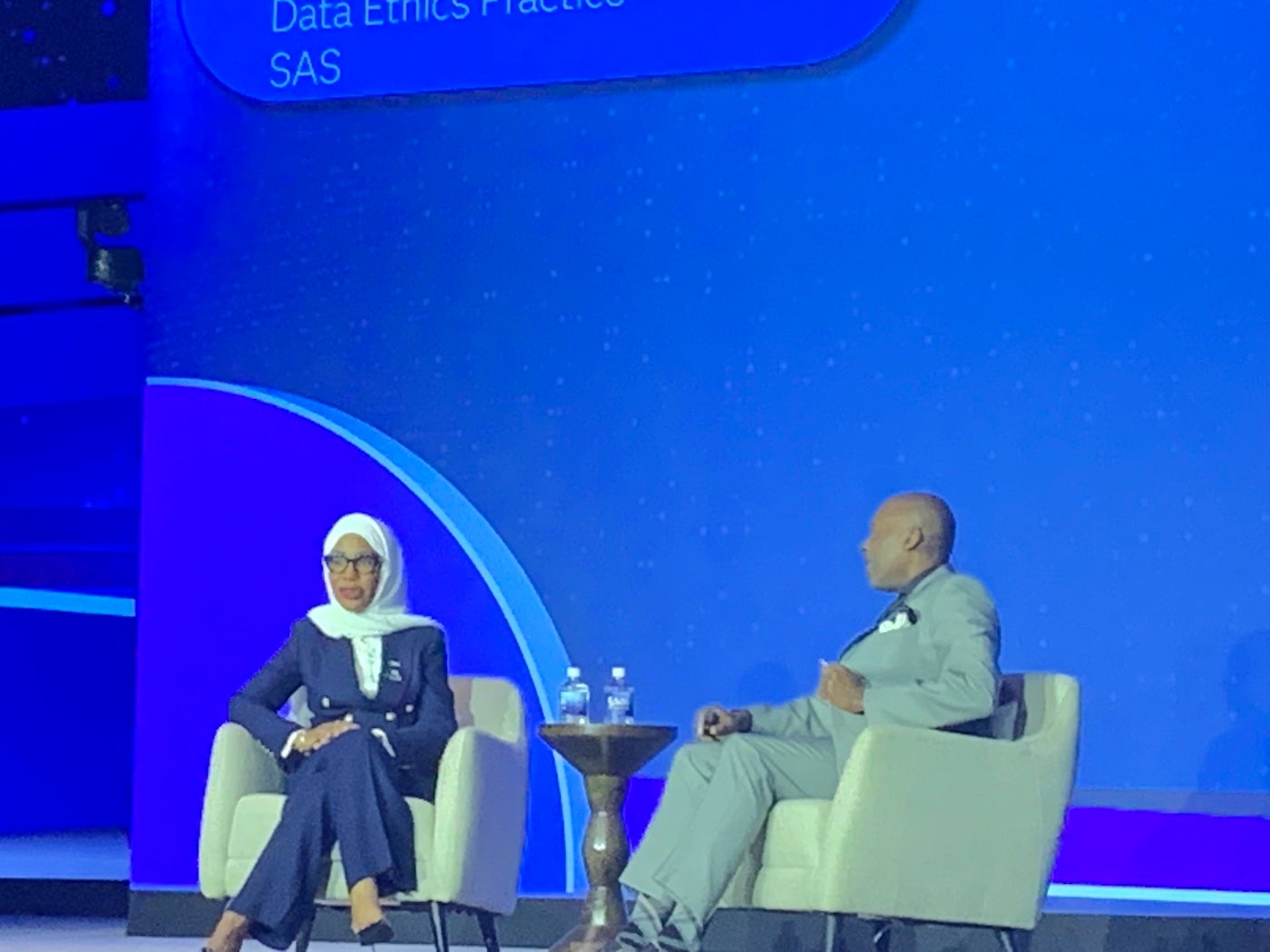Ad
 At SAS Innovate 2025, Mubaraka Ibrahim, chief AI officer of Emirates Health Services, on the left, and Reggie Townsend, vice president of the SAS Data Ethics Practice. Image: Drew Robb/TechnologyAdvice
At SAS Innovate 2025, Mubaraka Ibrahim, chief AI officer of Emirates Health Services, on the left, and Reggie Townsend, vice president of the SAS Data Ethics Practice. Image: Drew Robb/TechnologyAdvice
AI is everywhere, and that’s a problem for many enterprises. According to Reggie Townsend, vice president of the SAS Data Ethics Practice, 58% of employees regularly use generative AI (GenA) and 60% of them do it without company involvement, putting the organization at risk.
During last week’s SAS Innovate event in Orlando, Florida, speakers repeatedly emphasized the importance of ethics and governance as vital ingredients of AI in the enterprise.
“Responsible innovation begins before the first line of code is written,” said Townsend. “AI governance offers a framework and toolset to ensure that AI is trustworthy, that the organization is protected, and that AI can act as a catalyst for innovation.”
Townsend added that AI is like a mirror because it accentuates both the good and bad in humanity. AI can be used as a force multiplier for human ingenuity or human frailty; AI also has the ability to help humankind create a better world or to bog us down in crime, deception, and even societal collapse.
“We need to make sure AI helps us to experience a better world and that begins with responsible innovators and AI governance,” said Townsend. “Governance makes it possible to monitor and respond when AI systems don’t operate properly.”
DOWNLOAD: This customizable Generative AI Policy from TechRepublic Premium
Governance is coming to enterprise AI
According to McKinsey surveys, 42% of organizations reported that AI improved their operations, and 34% said AI led to greater customer trust. It is no surprise, then, that 25% of large enterprises plan to heavily invest in AI governance support.
Townsend touted SAS Viya, which has built-in governance features such as the newly released AI Governance Map that is offered free to SAS users. Organizations can use it to assess their current AI governance maturity in four areas and chart the path forward. In addition, SAS offers an AI governance solution for banking, with the SAS Model Risk Management sitting at its foundation. The company has other industry governance solutions in development.
“A SAS holistic AI governance solution is coming later this year for private preview,” said Townsend. “Guardrails are needed for AI: The only thing better than a quick decision is a decision you can trust.”
More must-read AI coverage
AI governance in healthcare
Townsend introduced Mubaraka Ibrahim, chief AI officer of Emirates Health Services (EHS) in the United Arab Emirates (UAE). The UAE is ahead of the curve on AI:
- It appointed an AI minister in 2017.
- It has established an AI university to train tens of thousands of AI experts.
- It has posted 22 Chief AI Officers across industry verticals to ensure AI is implemented securely and well across the nation.
Emirates Health Services has more than 130 facilities across its network, and it plans to use AI to be among the best healthcare providers in the world. The EHS intelligence platform uses 40 AI models for prediction and healthcare analytics; examples include mortality risk prediction for patients in intensive care, and models tailored to the surveillance of disease as a way to contain its spread and lower infection rates.
“AI is a force that can elevate healthcare,” said Ibrahim. “It can be used to build trust between providers and patients.”
Next up, Dr. Michel van Genderen from Erasmus Medical Center in the Netherlands explained how AI is helping his organization to solve greatly increased demand amid a shortage of healthcare personnel. When performing respiratory surgery, he only uses AI if he is confident of its conclusions and feels that it is safe and its decisions are explainable.
“We used AI to redesign the way we work by providing it within a responsible governance framework,” said van Genderen. “AI enabled us to make major improvements in respiratory care across all shifts.”
Ad

